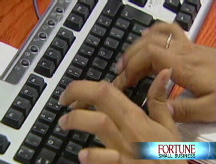Find funding for a biz
Banks are tightening the squeeze, but that doesn't mean you can't come by start-up cash.
(Money Magazine) -- If you're considering starting a business in 2009, you're probably wondering how the heck you'll finance it. Raising start-up capital has always been a challenge, but the downturn has made a hard process harder.
Some 85% of banks have tightened standards on small business loans over the past three months, according to the Federal Reserve. Plus, home-equity lines are being frozen and credit-card limits are being slashed.
To finance a start-up today, "prepare a good business plan with revenue projections for the current economic climate," says Eric Zarnikow, director of capital access for the Small Business Administration (SBA). Then expect to hit up several sources, in this order:
After your own savings, your best option is "friendly capital" -- that is, money from people you know. The upside: The lenders have a personal stake in your success. Plus, they may offer cheap rates -- if they charge interest at all. The downside: Aunt Myrtle never speaks to you again because you've whittled away her rummy winnings. To make it work for everyone, bring in legal counsel and put the financial details in writing. If it is a loan, use a service like Virgin Money (virginmoney.com) to facilitate repayment.
Bankrate.com senior financial analyst Greg McBride suggests tapping a home-equity line of credit (HELOC) if you can qualify for one -- and that's a big if these days. Rates average 5.21%, making it one of the cheapest ways to borrow. Plus, unlike with most other loans, the interest you pay is tax deductible. But because you'll be eating away at equity, it's a better option for those who live in areas where home values aren't falling precipitously.
The more places you go, the better chance you have of being approved. Credit unions and community banks haven't been as battered by the crisis as major banks. So they're great starting points, especially if you need less than $100,000.
If you can't get conventional financing, ask the bank if it is a lender of SBA-guaranteed loans. Lending standards on these tend to be a bit looser. You'll pay more -- 6.75% now -- but you usually get longer repayment terms.
Before searching for a lender, meet with a counselor from one of SBA's resource programs (find info at sba.gov) who can advise you on your options.
On sites like LendingClub.com, Loanio.com and Prosper.com, you can request loans up to $25,000 from other average Joes. (Prosper.com is on hiatus while completing a Securities and Exchange Commission registration, but the site should be operational again in the first half of 2009.) Peer-to-peer lending tends to be pricier than bank financing. Only 15% of those who apply at Lending Club receive loans, and for those who do, the interest rate averages 11.2%.
Because plastic is high-interest debt, it should be your last resort. (The average variable-rate card has an APR of 11.27%, and penalty rates go as high as 30%.) But this may be your only option, given the tightening loan standards. If you use it, pick cards with the lowest post-introductory rates -- and treat them like installment loans, determining a monthly payment that will have you squared by a predetermined date. The debt-reduction planner at cnnmoney.com/tools can help.
Need help with your business? Submit your questions to money_letters@moneymail.com. ![]()



